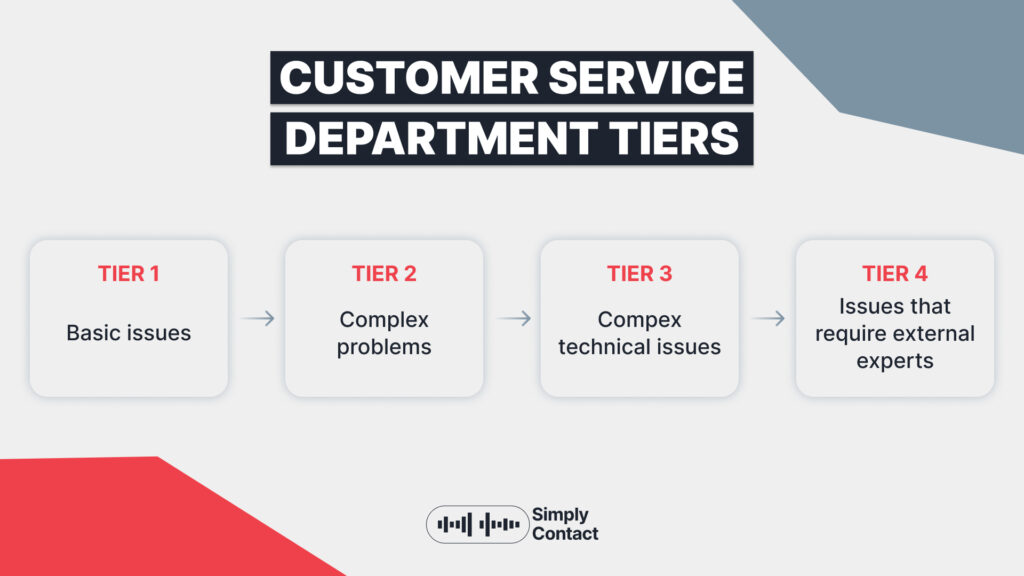At Simply Contact, we specialize in creating personalized customer support solutions that drive business growth and customer satisfaction. Let us help you elevate your customer experience and stand out from the competition.

Customer Service Department: Team Structure and Responsibilities
Customer service plays a central role in any business. It handles inquiries, resolves issues, and acts as the brand’s voice. Strong service is known for building loyalty: HubSpot reports that 93% of customers are likely to return to companies that deliver it.
The department’s structure depends on the organization’s size and customer base, but typically it includes frontline representatives, supervisors, managers, and executives, each with their clear responsibilities.
This article looks at the key responsibilities within a customer service department. At Simply Contact, we support companies of all sizes—industry leaders, startups, and SMBs—by providing customer service that matches their standards.
As a customer support outsourcing company, we collaborate with industry leaders, startups, and SMBs to deliver exceptional service.
How we work
What is a customer service department?
The customer service department is represented by support teams that assist customers on behalf of the company. Traditionally, the tone of voice and behavior of service teams match the company’s values and reflect its current strategies.
What does a company's customer service department do?
A good customer service department does more than pick up the phone. Its real purpose is to make customers feel heard and valued. When people sense that a company listens, they’re far more likely to come back. One survey found that 68% of customers purchase more when service is dependable.
In essence, the success of a company depends on the performance quality of its customer service representatives. Dive into the importance of the department of customer service by understanding the key responsibilities outlined below. The customer service department normally deals with:

Key functions of a customer support department:
- Addressing customers’ complaints and queries
- Providing information
- Taking care of orders and other transactions
- Problem-solving
- Prompt assistance with technical issues
- Reaction to customers’ reviews
- Feedback collection
- Creation of content for help, such as FAQs
- Keeping customers aware of the current company’s offers
Now, let’s review the responsibilities of the customer service department in more detail and explain exactly how teams work.
Answering customers' questions
Most of the work starts with questions. Some are simple: “When will my order arrive?” Others are more complicated. Either way, the agent is expected to know the answer or at least know where to get it fast. That’s why frontline teams need a real grasp of how the company works, not just a script.
Handling transactions and orders
One key task for the customer service staff is managing incoming orders and processing transactions. Other responsibilities include managing product returns and exchanges. The team leaders must ensure that orders and transactions are processed swiftly and effectively.
Resolving problems and fixing technical issues
The role of customer service representatives in technology companies goes deeper. Customers expect help with installations, updates, or fixes when something stops working. These aren’t just friendly conversations, but those that require technical skill. A good service rep can guide someone through setup or troubleshoot an error without losing patience.
Keeping customers updated about offerings
The work of service agents requires more than just answering phone calls. Service requires agents to inform customers about available promotions and discounts, as well as new product features. Agents receive occasional requests to promote additional products, but their primary duty remains customer support. The essential duty of service staff is to inform customers about available options and maintain customer satisfaction high.
Handling customer complaints
Not every interaction with the company leaves a positive impression on both customers and service representatives. The way customers will remember their entire experience with a company is determined by how frontline agents handle their complaints. Working in a customer service department requires its employees to have skills for communication and empathy to transform negative situations into positive ones.
Gathering feedback
The role of a customer services team is also a listening post. Teams pick up insights through follow-ups, suggestions, and even quick comments dropped on a call. Increasingly, they collect input through email and social media too. Those insights often end up shaping what the company changes next.
Addressing customer reviews
In the era of social media, feedback doesn’t stay private. Customers leave reviews on company pages or social platforms, and negative ones can hit hard. That puts service teams in the position of public responders who are tasked with handling criticism while defending the brand’s reputation.
Turning company's knowledge into helpful content
Finally, customer service representatives possess all the necessary information about the company. They have a complete understanding of all procedures and product-specific characteristics. This data enables the creation of FAQs, guides, and troubleshooting materials that empower customers to handle their own problems.
Types of customer service departments
Customer support departments can take different forms depending on the business objectives, communication methods, and service geography. Here are some common types:
1. Inbound support department
This customer experience department is responsible for processing incoming requests from customers. It includes calls, emails, and requests via forms on the website and in the chat. The main tasks of such a department:
- Quickly find customer requests;
- Assist in solving problems;
- Provide information about products and services.
- Process failures.
This format is especially relevant for online stores, banks, insurance companies, and service platforms.
2. Multilingual support
Companies operating in several markets create opportunities to work with customers in different countries. Such departments:
- Provide support in English, German, American, Spanish, and other languages;
- Take into account cultural features of communication;
- Often work in different time zones.
It is essential for e-commerce companies, airlines, and services with an international audience to provide multilingual customer service to maintain a competitive edge in global markets.
3. Social media and online chat support
Modern customers control the mode in social networks and messengers. Such departments:
- Respond to messages on Facebook, Instagram, Twitter, Telegram, and other platforms;
- Conduct online chats on the website or in the application.
- You can use auto-responses and bots for the first line of support.
This type increases customer engagement and helps to fulfill simple requests.
4. Technical support
Such departments work with more complex requests related to technical failures, equipment, or software setup, and they often require specialized knowledge and training. Typical for IT companies, SaaS services, and equipment manufacturers.
5. Outsourced contact center
A contact center that operates as an outsourced service provides complete support for all major customer service operations, including phone calls, multilingual assistance, social media engagement, and complex technical issue resolution. The outsourcing model enables businesses to reduce costs while delivering premium service quality through a workforce that replaces the need for internal staff expansion. Professional call center services provide businesses with trained representatives who deliver continuous 24/7 support that fulfills organizational needs.
Customer service department tiers

A tiered support model is mostly applied in technical support, but if your department also handles technical issues, you can also consider it. Within this model, all requests are divided into support tiers or levels to streamline the process and reduce the resolution time. For instance, basic questions are handled by Tier 1 and 2 support teams, while more complicated requests can be processed by Tier 2 and 3, where more experienced agents handle them faster. Tier 4 mostly works with external means like third-party services.
Tier 1
It is the first level of customer assistance, typically referring to handling simple questions and common issues. Support agents on Tier 1 help customers with password resets and website navigation. They can also assist with explaining the product features and how to use them. If the technical issue is simple, they guide users through basic troubleshooting. If a customer faces a more complex problem, an agent may collect valuable details before transferring the request to a higher tier of support.
Tier 2
Working at Tier 2 requires deeper expertise when it comes to the brand’s products and services. Tier 2 agents handle technical issues that were not solved at the first level. They can also work with billing and refund systems via internal tools.
Tier 3
Agents at Tier 3 work with complex issues that require extensive knowledge about the products and skills to solve serious technical problems. They provide advanced troubleshooting and analyze software problems. So, it means they take over the requests where Tier 2 and Tier 1 agents were not able to assist due to the complexity.
Tier 4
It is the highest tier of support, covering issues that require the assistance of external experts. If Tier 3 cannot resolve the problem, the request is forwarded to Tier 4 agents, who explore alternative solutions by consulting with vendors, developers, or manufacturers, depending on the type of issue. Tier 4 support may be provided as third-party services if the company hires an outsourcing team to handle the most complex issues that require specific knowledge or skills.
How to ensure the efficiency of the customer service department?

No company thrives if its departments lag behind, and the customer service department is no exception. The way this team operates can make or break customer loyalty. Business leaders who want to strengthen performance have several levers to pull. Here are some of the most effective:
Harnessing the power of customer feedback
Customer feedback is the clearest mirror of how your team performs. Positive feedback reveals operational strengths, but customer complaints reveal system weaknesses. The appearance of recurring negative feedback complaints indicates that staff training needs assessment and process evaluation, and customer interaction methods require adjustment.
Setting goals for team and individuals
Clear targets truly make a difference. Whether short-term or long-term, goals give entire teams and individual agents something concrete to measure against. They also foster accountability. When agents create their own performance targets, they transform into active problem-solvers who take initiative. A culture that generates consistent results emerges when you combine agent-initiated objectives with scheduled performance assessments and fast issue resolution.
Implementing ongoing training and coaching
Providing performance feedback to your customer service team is merely the first step. The process requires organizations to deliver essential resources for improvement after initial feedback delivery. The process requires more than showing weaknesses to customers and proposing solutions. Your team requires motivation and specific guidance to reach their performance targets.
The process of continuous training and coaching becomes essential at this point. Your customer support teams receive essential abilities through continuous feedback, mentoring, and expert guidance. The right tools enable your team to predict customer requirements, which results in superior customer service delivery.
The implementation of technology continues to expand its influence in this field. Agents can practice safely through artificial intelligence tools, which create realistic customer interactions. The simulated customer interactions help agents develop their skills by practicing challenging dialogues and decision-making exercises before they encounter actual customers.
Our agents at Simply Contact have access to an AI simulation that allows them to practice in an environment close to real customer support before they start speaking with actual people. Introducing this tool has proven very effective and helpful, elevating training results and lowering its cost at the same time. Find out more in the case study.
Structure, roles, and responsibilities of the customer care department

Employees are the lifeblood of any business, and this is especially true in customer service. The team members at the front lines work daily to resolve customer issues while providing answers and defending the company's image. Leaders face the dual task of assembling teams with the right competencies while providing development opportunities to their members.
Outsourcing partners often help here. One benefit of this strategy is that outsourcing companies regularly enhance their team members' skills through targeted training sessions.
A well-organized customer service department requires multiple essential positions to function properly. Each team member brings unique expertise to deliver a unified customer experience. Let's explore these positions.
Customer service manager
A strong manager sets the pace for the entire team. The customer care department manager oversees daily operations, establishes performance metrics, and maintains employee readiness through procedure updates and tool distribution.
During call center call spikes, this role becomes even more important. Managers mentor agents, keep morale up, and step in to resolve escalated issues.
The best managers balance diplomacy with decisiveness. They know when to support their team quietly and when to take firm action. Empathy helps them retain customers during sensitive situations, while leadership skills ensure the department works like a coordinated unit.
Customer service representative
Customer service representatives serve on an organization's front lines. They are the first human voice or message a customer hears from the company. They handle inbound requests, process returns, and resolve complaints. Every interaction shapes how the customer perceives the brand. This means tone, clarity, and accuracy matter as much as efficiency.
Reps must be approachable, patient, and quick to adapt. In e-commerce, they may manage high volumes of order-related inquiries. In services, they deal with critical complaints that require both deep listening skills and emotional understanding. The customer service rep must handle current issues but also create conditions for customers to develop trust in the company.
Customer support specialist
The customer support specialist functions as a vital member of the customer service team. The specialists in this role assist customers in understanding product and service usage and resolve brief technical issues. The specialist needs to possess excellent communication skills to explain complex information through simple directions while keeping their composure and showing empathy to customers.
Client relationship manager
Client relationship managers serve as essential professionals who create lasting customer loyalty. The main duty of these professionals involves building relationships with new business clients. The most important traits of excellent client relationship managers include their ability to resolve complex problems and maintain professional behavior at all times. The position requires handling major B2B accounts and building loyal customer relationships in the retail and travel sectors.
Customer service engineer
The customer service engineer position stands as the least common yet essential role in the organization. The technical support teams of tech companies use these professionals to resolve complex issues that standard customer support personnel cannot handle. The role exists primarily in software development, telecommunications, medical devices, industrial equipment, and fintech customer service sectors because their products need advanced technical knowledge and troubleshooting skills.
Customer service engineers perform three main tasks, which include customer interaction for issue detection, followed by solution discovery and verification through testing to validate the solution.
Reach out to explore our services and discover how we can elevate your customer support operations.
Contact us
Challenges faced by customer service departments
Even with well-established processes, customer support departments face several challenges that affect efficiency and team atmosphere.
- Constantly dealing with unhappy customers, repetitive work, and performance-based KPI targets results in emotional exhaustion and burnout among staff members.
- The absence of sufficient product information prevents agents from delivering excellent customer service and solving customer needs effectively.
- The use of outdated support tools and technical problems leads to longer request handling times and increased work for the department staff.
- The absence of communication between marketing, sales teams, and customer support prevents them from delivering a unified customer experience.
- Supporting multiple customer channels can become challenging due to the need for synchronized operations, flexible resources, and additional personnel.
How to structure the customer service department right: Best practices
The right customer service department setup and management can help effectively handle most of the challenges mentioned above with ease. Ensuring that your department includes all the key roles is not enough; here are a few practices we consider best for arranging productive work and achieving service excellence.
Leadership
Regardless of the company structure you adopt, commitment to customer support should be evident at the leadership level. When department heads demonstrate their determination to create a positive environment for employees and customers, ensuring high customer satisfaction, the support team can operate more effectively. Effective management and wise leadership with influence on the higher level can improve the company’s business model.
Value every employee and support them
At Simply Contact, we believe that the best department setup is one where staff members are genuinely cared for and supported by their service managers, helping them succeed and develop. It includes both professional and personal growth. Individual discussion and creation of positive touchpoints within the team encourage service agents to communicate and be more motivated.
The vision of tomorrow
In our experience, employees are more motivated when they know what to expect from the future. For instance, it's beneficial to share where the organization is currently and where it is headed. If the company is growing, communication with employees will help keep them informed about staffing plans and ensure that you have enough team members to maintain effective support without overloading staff. If youчче? encourage asking questions and discuss the future perspective, employees are more sure about their role in the company’s future.
Communication
Communication is the key to effective teamwork; it encourages staff to share their ideas and inform about inefficient work processes. When agents can share their concerns with their managers, you can prevent teams from burning out, improve performance, and reduce the likelihood of mistakes.
Clear organisational structure
When establishing a customer support department, it is essential to clearly define all roles, authorities, and responsibilities. Team members should know their personal duties and understand the company’s organizational structure. The workflows are more productive when all the employees understand the leaders’ responsibilities and know who they can contact for advice and guidance.
Feedback from managers and agents
We recommend fostering a culture of open and constructive feedback. Employees will be able to share their opinions on ineffective processes. At the same time, managers can explain what needs improvement in the agent’s work and advise on how to achieve this, guiding them in their personal growth. By working on their weak areas, customer support team members can enhance their performance and provide more effective assistance to customers. Establishing clear performance expectations and discussing how well they match them will also help to organize the process.
Customer service department KPIs and metrics
Clear indicators are used to evaluate the effectiveness of the customer service department. They help analyze work, identify bottlenecks, and develop the team. Here are the key metrics:
- First Response Time (FRT) shows how quickly the agent responds to the first request. The faster, the higher the customer satisfaction.
- Average Resolution Time: On average, how long does it take to resolve a customer's request fully? The balance between speed and quality is essential here.
- First Contact Resolution shows how many requests were closed without repeat requests. A high figure indicates the team's competence.
- Customer Satisfaction Score (CSAT): This is measured based on the results of surveys after the request. Often, it is a scale from 1 to 5 or 1 to 10.
- Net Promoter Score (NPS): Assess the customer's willingness to recommend the company. Question: "How likely are you to recommend us to your friends?"
- Request volume and agent load: Analyzes the number of requests, their distribution between channels, and the load per specialist. For companies using outsourced omnichannel customer experience management, this metric serves as a foundation for efficient resource planning, enabling them to maintain consistent service quality without overloading their internal teams.
- Staff turnover. Frequent staff turnover reduces stability. This indicator enables the team to react promptly and enhance its performance.
Summary
The customer service department plays a crucial role in achieving customer satisfaction and building loyalty. It handles customer complaints while resolving issues and works to improve customer interactions.
We are Simply Contact, a customer support outsourcing company that helps businesses take better care of their customers. Our role is to provide the people, processes, and tools that keep customers satisfied and loyal. Some companies turn to us to improve the performance of their current service department, while others rely on us to set up an entirely new structure. In both cases, we build teams that fit the project, so the support function works smoothly and strengthens the company’s reputation.
Get fast answers to any remaining questions
Thank you.
Your request has been sent successfully.
Your request has been sent successfully.






